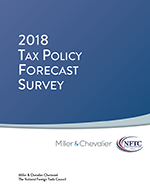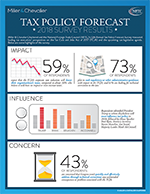Tax Reform Sparks Hopes, Questions for Executives in 12th Annual Tax Policy Forecast Survey by Miller & Chevalier and the National Foreign Trade Council
Subtitle
Executives welcome legislation's impact on competitiveness, but request clarity
Washington, DC, April 16, 2018 – Just months after passage of the first comprehensive tax reform law enacted in more than 30 years, tax executives are optimistic about the effect of the Tax Cuts and Jobs Act of 2017 (TCJA) on their businesses. But they believe more work remains to be done, and most respondents intend to request regulatory guidance or technical corrections to the law, according to results of the 2018 Tax Policy Forecast Survey, published today by Miller & Chevalier Chartered and the National Foreign Trade Council (NFTC).


Click Images to View Full Report and Infographic
Respondents are nearly unanimous in their belief that the TCJA will improve the standing of U.S. businesses on the global stage. In addition to increased competitiveness of U.S.-based businesses, industry leaders overwhelmingly expect that the U.S. will become more attractive for foreign direct investment. The reduced corporate tax rate post-TCJA has moved the U.S. from the highest rate among large economies to a much more competitive position, increasing the attractiveness of the U.S. economy for businesses in search of investment opportunities.
"For years, respondents told us that one of the main goals of tax reform would be to address the high statutory U.S. tax rate – and last year's legislation did that," said Miller & Chevalier Chair Marc Gerson, former majority tax counsel to the House of Representatives Committee on Ways and Means. "However, our respondents also recognize that administrative guidance, technical corrections, and other mechanisms are needed to provide certainty to taxpayers, and it's unclear in the current regulatory and administrative environment when we'll see this necessary clarification."
Respondents lack consensus regarding which parts of the new legislation most need attention, though most share the common TCJA concern that Congress will not be able to pass a technical corrections bill in a timely manner. Unlike the TCJA, technical corrections cannot be enacted using reconciliation measures, so a bipartisan vote will be required to enact a technical corrections bill. The political environment, coupled with the upcoming midterm elections, makes the prospects for such bipartisan legislative action challenging.
Respondents also believe that other legislative matters, including those in the headlines and outlined during the Presidential campaign, such as an infrastructure spending package and immigration reform, will dominate the agenda of President Donald Trump – the individual whom respondents think will have the most significant impact on tax policy in 2018.
"Respondents have historically viewed Congressional leaders as the individuals who would most heavily influence tax policy," said Cathy Schultz, National Foreign Trade Council Vice President for Tax Policy. "Ranking President Trump as the most influential in this year's survey shows that respondents understand the importance of the TCJA's implementation to the President, though they also recognize that there are other agenda items that may dominate his attention."
Survey Highlights
- Respondents still seem to be weighing the TCJA's impact and are approaching the changes from a wide swath of perspectives. For example, while 59 percent of executives believe the TCJA's dramatic corporate rate reduction from 35 percent to 21 percent will decrease their taxes, one-third say the new law will have no impact or will actually raise their taxes.
- 73 percent of respondents plan to seek regulatory or other administrative guidance with respect to the TCJA, and 61 percent will seek technical corrections to the law. However, 43 percent of respondents are concerned that Congress won't be able to effectively enact such technical corrections in a timely manner, and another 23 percent worry about the TCJA's ability to endure following the 2018 and 2020 elections.
- 59 percent of executives believe an infrastructure spending package will be enacted this year, and 46 percent believe we will see immigration reform – the latter even though Congress held several failed votes on immigration over the survey's open period. Both topics are hot-button issues that will require significant Administration focus to advance.
- There is lack of consensus among respondents regarding which provision in the TCJA is in greatest need of guidance. Executives are almost equally divided between wanting guidance regarding the global intangible low-taxed income (GILTI) rules (17 percent), the base erosion and anti-abuse tax (BEAT) (16 percent), the pass-through deduction for qualified business income (16 percent), and the limitation on the deduction of business interest expense (15 percent).
A full copy of the survey results and analysis is available here. A link to the survey results infographic is available here.
About Miller & Chevalier
Founded in 1920, Miller & Chevalier is a Washington, DC law firm with a global perspective and leading practices in Tax, Litigation, International Law, Employee Benefits (including ERISA), White Collar Defense and Internal Investigations, and Government Affairs. Miller & Chevalier is a top-ranked firm sharply focused on targeted areas that interact with the federal government. Over the past three years, the firm's lawyers have represented more than 40 percent of the Fortune 100, one-quarter of the Fortune 500, and approximately 30 percent of the Global 100. Based in Washington, DC, a significant number of firm lawyers have held senior positions in the U.S. government and have written many of the regulations they currently help clients navigate. For more information on the firm, visit www.millerchevalier.com.
About the National Foreign Trade Council
The National Foreign Trade Council (www.nftc.org) is a leading business organization advocating a rules-based world economy. Founded in 1914 by a group of American companies that supported an open world trading system, the NFTC and its affiliates now serve more than 300 member companies through offices in Washington, DC, and New York.
###
CONTACTS:
Marc Gerson, Chair, Miller & Chevalier, 202.626.1475
Catherine Schultz, Vice President for Tax Policy, National Foreign Trade Council, 202.887.0278, ext. 104
Megan Duero, Media Relations, Greentarget, 312.253.7293